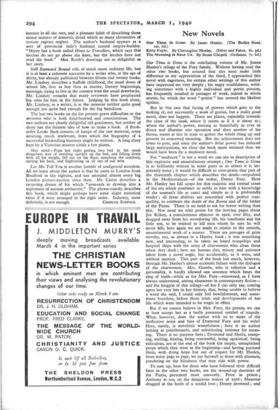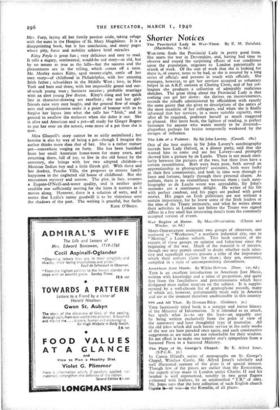New Novels
Our Time is Gone is the concluding volume of Mr. James Hanley's trilogy of the Fury family. Without having read the other two books, but assured that this need make little difference to my appreciation of the third, I approached this novel with eagerness, for certain other writings of this author have impressed me very deeply ; his angry truthfulness, weld- ing sometimes with a highly individual and poetic passion, has frequently resulted in passages of work, indeed in whole stories, for which the word " genius " has seemed the likeliest epithet.
But in this case that fusing of powers which goes to the making of, not necessarily a work of genius, but a really good novel, does not happen. There are places, especially towards the close of the book, where it seems as if it is about to ; where the author's power, moving as beautifully as ever to direct and illumine one operation and then another of his theme, seems at last in train to gather the whole thing up and present its concerted meaning. But the achievement does not come to pass, and since the author's fitful power has induced large anticipations, we close the book more irritated than we would have been by a mediocre novel.
For " mediocre " is not a word we can use in description of this explosive and unsatisfactory attempt ; Our Time is Gone is as brilliantly written in some parts as in others it is im- potently noisy ; it would be difficult to over-praise that part of the thirteenth chapter which describes the death—torpedoed in the Mediterranean—of the stoker, Denny Fury. Here Mr. Hanley has full scope for that majestic and eternal sense of the sea which combines so nobly in him with a knowledge of the seaman's life as exact and simple as it is profoundly tender ; all these abilities are assembled with perfect tran- quillity, to celebrate the death of the Ronsa and of the father of the Furys. There is no need to ask for better writing than this. Nor need we stint praise for the moving pages about Joe Kilkey, a conscientious objector in 1916, over fifty, and dragged away from his stevedoring life, his loneliness and his little son, to be trained to kill men whom he says he will never kill; here again we are made to rejoice in the smooth, unsentimental work of a master. There are passages of grim novelty, too, as always in a Hanley book ; it was something new, and interesting, to be taken on board troopships and hospital ships with the army of charwomen who clean them when they dock ; here are human dirt, misery and patience taken from a novel angle, but accidentally, as it were, and without unction. This part of the book lost much, however, through Mr. Hanley's almost eccentric failure with the dialogue of the charwomen. Mrs. Gumbs, who is talkative and a personality, is hardly allowed one sentence which bears the ring of truth—while as for Mrs. Fury—renowned, as I have always understood, among characters in contemporary fiction— and the kingpin of this trilogy—of her I can only say, coming upon her very late in her history, that, being unable to believe a word she said, I could only feel bewilderment, and some- times boredom, before those trials and developments of her life which were intended to be tragic in effect.
But if we cannot believe in Mrs. Fury, the person, we can at least accept her as a badly presented symbol of tragedy. What, however, does the author wish us to make of the ineffective noise and fuss of Desmond Fury and his wife? Here, surely, is novelistic wastefulness ; here is an author lashing at pointlessness, and substituting violence for mean- ing. There is no purpose here ; Desmond and Sheila, stamp- ing, smiling, kissing, being remorseful, being egotistical, being ridiculous, are at the end of the book the empty, unexplained props which they were at the bcginning—and having pursued them, with dying hope but out of respect for Mr. Hanley, from noisy page to page, we say farewell to them with pleasure, pondering on the blindness that may ride with power.
To sum up, here for those who have followed their difficult fates in the other two books, are the wound-up destinies of the Furys, presented most unevenly. Peter in prison ; Anthony at sea, on the dangerous waters of 1916 ; Maureen dragged at the heels of a sordid love ; Denny drowned ; and Mrs. Fury, laying all her family passion aside, taking refuge with the nuns in the Hospice of St. Mary Magdalene. It is a disappointing book, but it has conclusion, and many pages where pity, force and nobility achieve brief miracles.
Kitty Foyle is great fun ; very delicious and easy to read. It tells a sugary, sentimental, would-be sad story—as old, but by no means as true as the hills—but the success and the pleasantness are in the telling, which comes off a treat. Mr. Morley makes Kitty, aged twenty-eight, rattle off her own story—of childhood in Philadelphia, with her amusing Irish father ; schooldays in the Middle West ; love, in New York and here and there, with her impossibly grand and out- of-reach young man ; business success ; probable marriage with an alert young Jew doctor. Kitty's slang and her quick line in character-drawing are excellent ; she and her girl- friends raise very easy laughs, and the general flow of tough- ness and outspokenness make it a point of honour with us to forgive her lapses into what she calls her " Irish," and in general to swallow the molasses when she doles it out. She is alive and American and a pet—all ready for Ginger Rogers to put her over on the screen, even more of a pet than she is now.
Miss Glaspell's story cannot be as airily assimilated ; her heroine is also by way of being a pet—though I imagine the author thinks more than that of her. She is a rather mature pet—somewhere verging on forty. She has been banished from her small American home-town for many years, and returning there, full of joy, to live in the old house by the cemetery, she brings with her two adopted children—a Mexican Indian boy and a little Greek girl. With these and her donkey, Pancho Villa, she proposes to restore family happiness to the neglected old house of childhood. But she encounters mystery and sorrow. The plot, in fact, assumes a Eugene-O'Neill-and-water quality, and is neither quite credible nor sufficiently moving for the hints it scatters as it moves along. However, there is a solution of sorts, and it seems that Lydia's sunny goodwill is to be victorious over the shadows of the past. The writing is graceful, but facile.
KATE O'BRIEN.















































 Previous page
Previous page